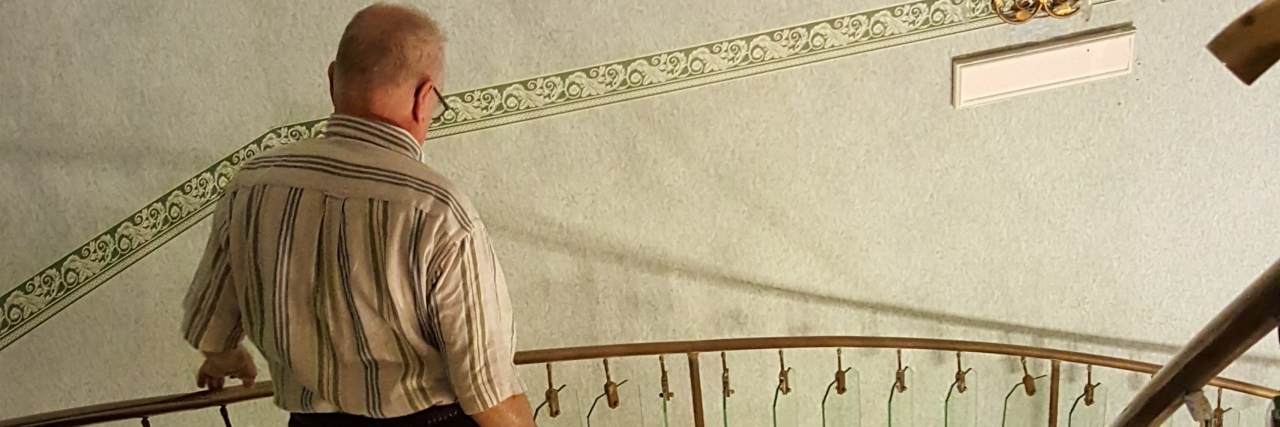My husband and I have always loved to travel. When the kids were small, we’d leave them for weeks with their grandparents while we toured Germany and Scandinavia. When they were old enough, we’d take them with us, enjoying the Luxembourg Gardens, the Ferris wheel in Vienna, the old castle in Salzburg and the salt mine slide. But they are grown-up now, taking their own children around the world, and we are free as never before, free to go off-season with no worries about school days or ballet lessons.
• The Mighty’s Caregiving Toolkit
Except… Now, my husband, Don, has dementia.
That changes a lot, but not everything. He has dementia and is 79, and I am autistic and 76, but we can still make it work. A few years ago, he told me he had to give up flying. After much discussion – he’s not always aware of what bothers him – it turns out he hates not flying, but airports. He feels confused and anxious and totally out of control. I don’t blame him. We seemed to be having more and more trouble with TSA, getting the right items in the right suitcase, finding the right line to wait in. In Copenhagen, he was mocked by a checker when he put his eyedrops in his carry-on instead of in a separate bag. We lost a gift knife in Munich when it was a fraction of an inch too long. All these problems were our fault, I admit, stemming from lack of attention. Or, just being old.
But there were other problems – at Heathrow we arrived too late to catch our connecting flight to Athens, due to lack of attention on the part of British Airways. That led to a day of frustration and charging from one end of the airport to the other. Coming back from Mexico, we found that duty-free shops there do not wrap packages securely enough for US customs. It was hard for me, as well, trying to discover to which gate our flight had been reassigned and which tram to take to get there. We used to be able to shrug these annoyances off, but no longer.
If we both went to the bathroom in airports, and he came out first, he would panic and wander away, looking for me. The noise level was so high, it was exasperating us both. I had to keep an eye out for quiet spaces where he could sit down and have a beer to recover. Maybe we’re too old, we mused. Maybe it’s time to give it up.
Complaining about this bore fruit. Friends told us that airlines can ferry you – for free — through the terminals if you’re disabled. And disabled we were. Don would have to ride in a wheelchair, we were told, and I could walk alongside. At first, he didn’t like this. I explained to the airlines that his problems were in his head, not his feet, but they were – nicely – adamant. That’s how we do it, they said, and I soon began to see why.
When you’re allowed to jump the line, pass through immigration and customs ahead of everyone, the wheelchair reduces the resentment of other passengers. People were very good about stepping out of our way or walking around. We were almost invisible. The service people were as nice as possible and we never felt we had to justify the special attention. Don loves the chair now, and the assurance the airport people have for getting around and finding the right gate is comforting to us both.
Once at our destination, we opt for a more expensive car and driver rather than public transport. That takes away the worry about getting off at the right stop, and the driver will usually carry our bags into the hotel. Until a few years ago, we were still using the trains. Getting on early, however, usually meant our bags were at the bottom of the pile by the door; there was no way we could get them onto the overhead shelf ourselves. When we exited in Florence, I had to hold off the incoming traffic while Don wrestled alone to retrieve our bags. In Naples, the first step into the car was so high we looked at it despair. Fortunately, a couple of people came along, grabbed our bags, threw them into the overhead, hauled us up the stairs, and demanded 10 euros. Thank God for them!
We also decided, to reduce anxiety on Don’s part, that we would go to one destination and stay there the entire two weeks, taking guided day trips if we wished. That worked well. Last trip, we chose a town – Taormina in Sicily – that was endlessly entrancing. It was amusing to us both that I could always find my way back to the hotel. “How do you do that?” he would say, only partly amazed. He knows his limitations.
So do I. And I’m only too willing to turn the daily cares over to someone else – cab driver, airport worker, tour guide, concierge – if it means we can keep traveling.

